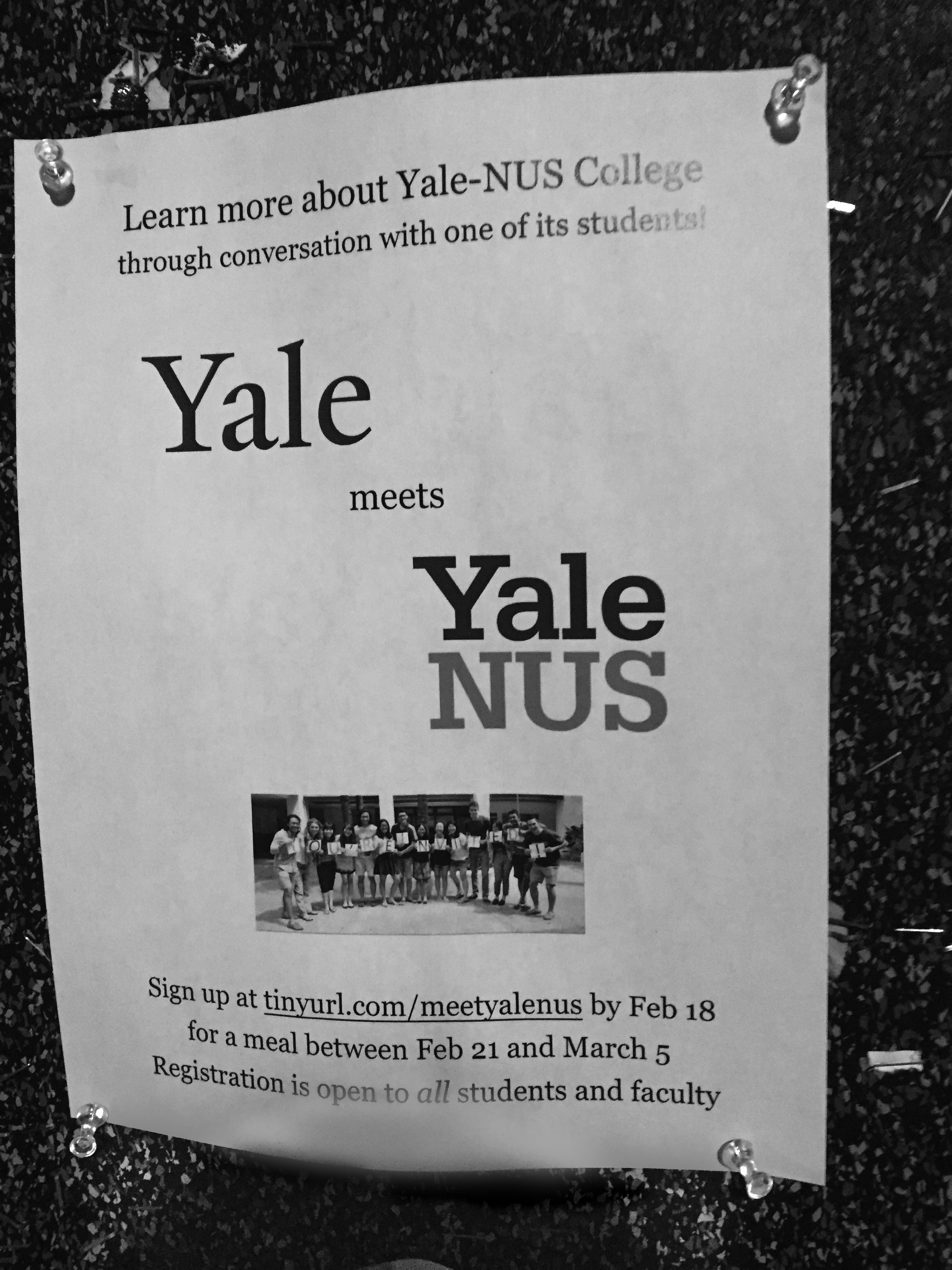
An initiative meant to pair Yale undergraduates with Yale-NUS exchange students over meals has seen little interest.
“Yale Meets Yale-NUS” allows undergraduates to sign up for meals with Yale-NUS students on exchange in New Haven and learn through casual conversations about the lives of their peers in Singapore. The program was modeled after the YalePlus lunch tag system — which paired Yale students to meet and bond over meals — that has since been adapted at Yale-NUS. Anna Evtushenko YNUS ’17, an exchange student who initiated the program, said she had expected all 24 Yale-NUS exchange students on campus this semester to sign up and at least 100 responses from the Yale community. But when registration ended last Thursday, she had received responses from only 10 Yale-NUS students and around 20 Yalies.
Nevertheless, Evtushenko said the low participation was understandable and that she “wouldn’t consider the event a failure.”
“Any initiative that could bring Yale and Yale-NUS closer, we should implement it … I hope that through small acts such as this, we can foster partnership between the two institutions rather than a top-down structure,” she said.
Because many faculty members teaching at Yale-NUS have taught at Yale in the past, students in Singapore often talk about Yale amongst themselves, Evtushenko said. But in New Haven, although many students know that Yale-NUS exists, few know about what it is like studying and living at the young institution, she added.
Before launching the program, Evtushenko said, she had expected high enthusiasm from the Yale-NUS exchange students group, because she thought everyone would be interested in meeting more Yale students and spreading the word about Yale-NUS. Evtushenko said the lower-than-expected participation rate could be due to the program’s relatively minimal publicity, which happened mainly through posters on campus and communication with the student group the Malaysian and Singaporean Association. The program is open to all students and faculty members.
Back at Yale-NUS, which sits on a much smaller campus, Evtushenko would be able to reach the entire student body by passing a dozen posters out, she added.
Still, Evtushenko added that the level of interest was understandable. The exchange students are often busier than Yale students, because in addition to academics, they have to figure out how to navigate Yale’s resources. Moreover, some are already interacting with Yale students on a daily basis and may not feel it is necessary to sign up for structured meetings.
“It is not the primary way, but just a supplementary way, for Yalies who might not have the chance to interact with us otherwise to meet students from Yale-NUS,” Evtushenko said.
Zachary Mahon YNUS ’17, who signed up for the program and has several meals scheduled this week, said he considered the meals “information-sharing” opportunities. He added that based on his interaction with Yalies so far, he finds them interested in why Yale-NUS was founded, how it evolved and what the life of a foreigner living in Singapore is like.
People are especially interested in Yale-NUS’s interaction with the Singaporean government and life in Singapore, Evtushenko said. This topic sparked huge debate in 2009 when Yale first announced its partnership to establish a liberal arts college in Singapore. Several Yale faculty members openly opposed the partnership, arguing that the authoritarian Singaporean government often contradicts the values of a liberal arts education.
Mahon acknowledged that Yalies’ knowledge about Yale-NUS often does not go beyond knowing of its existence. But he said this is reasonable, as life at Yale is hectic, and it is impossible to keep track of everything.
Three Yale students interviewed said they did not know much about Yale-NUS and would be interested in finding out more.
Anna Hill GRD ’21 said she has heard of the school, but that she does not know anything other than its Singapore location. She had not heard of the “Yale Meets Yale-NUS” event, but said it is a good way to exchange ideas between both communities.
Anna Hwang ’19 said she only knows about Yale-NUS’s name and location. Like Hill, Hwang had not heard about the opportunity to meet Yale-NUS students over meals.
Hwang said she would be interested in learning about the curriculum at Yale-NUS, how the living environment differs from New Haven’s and whether international students experienced any cultural shock in Singapore.
Meals scheduled through “Yale Meets Yale-NUS” started last Sunday and will end on March 5.







